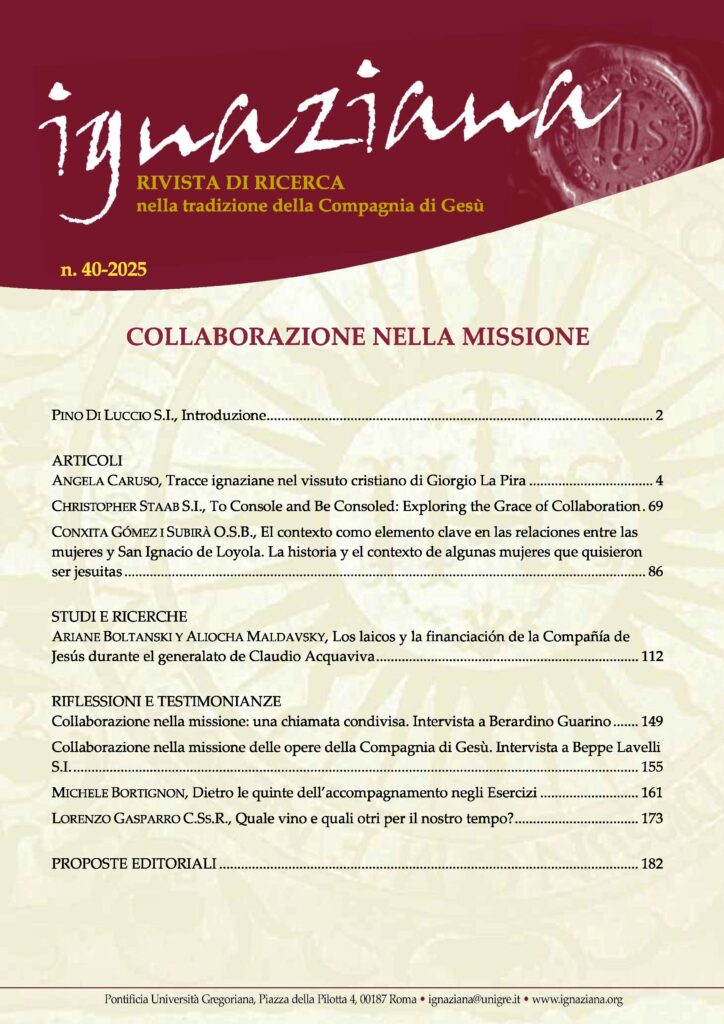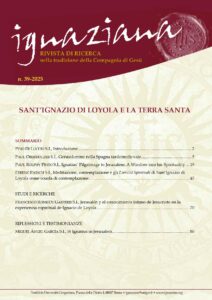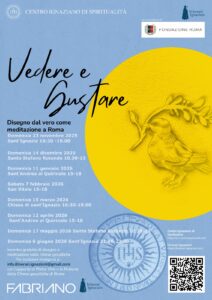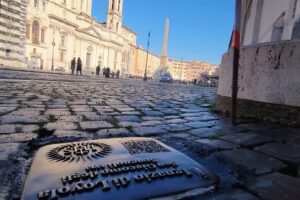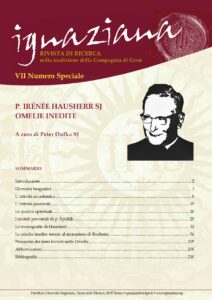
PINO DI LUCCIO S.I., Introduzione
PAPA FRANCESCO, Incontro con la comunità accademica della Pontificia Università Gregoriana (5 novembre 2024)
The document is a speech by Pope Francis addressed to the academic community of the Pontifical Gregorian University, delivered on November 5, 2024. In this address, the Pope reflects on the importance of the educational and spiritual mission of the university, emphasizing the need for an education that goes beyond intellectualism and embraces a more human and charitable dimension.
Main themes addressed by the Holy Father include:
• Integration and Mission: Francis discusses the union of various academic institutions within the Gregorian University, stressing that it should not merely be an administrative restructuring but an opportunity to renew the educational mission in the current context.
• Heart and Relationships: The Pope insists on the importance of “heart” in educational relationships, highlighting that teaching should be an act of mercy and care rather than just a transfer of knowledge.
• Critique of Efficiency: A purely efficient approach that neglects spirituality and mission is criticized, warning against the risk of a “Coca-Cola-ization” of research and teaching.
• Inclusive Education: Francis draws attention to the necessity of an education that welcomes everyone, especially the poor, promoting a culture of encounter rather than waste.
• Reflection on the Future: The speech concludes with an invitation to reflect on how the university can face contemporary challenges, including the impact of artificial intelligence, while always keeping human dignity and generosity at the center.
In summary, Pope Francis urges the academic community to rediscover the value of educational mission as a tool for love and service, inviting everyone to walk together towards a future of hope and solidarity.
PEDRO R. RODRÍGUEZ LÓPEZ S.I., “Saber los unos de los otros” Un acercamiento a la encuesta realizada por el P. Jerónimo Nadal a los jesuitas de su tiempo
The article “Saber los unos de los otros” by Pedro R. Rodríguez López S.J. analyzes an important survey conducted by the Jesuit Jerónimo Nadal between 1561 and 1567, aimed at various Jesuit communities in Europe. The main objective is to examine the questions and answers collected to understand how the Society of Jesus was forming in its early years and what the profile of members interested in following the lifestyle of the founder, Ignatius of Loyola, was.
Through a questionnaire consisting of 133 questions, Nadal sought to better understand the members of the Society, highlighting the importance of interpersonal relationships within the order. The responses, preserved in the Roman Archive of the Society of Jesus, provide valuable testimony about the lives and experiences of Jesuits at that time, contributing to outlining the history and evolution of the Society.
The article also emphasizes Nadal’s crucial role as a mediator and promoter of the foundational charism, showcasing his ability to unite different generations of Jesuits and transmit the essential values of the Society. The research aims not only to present the results of the survey but also to offer a key to better understand the history of the Society of Jesus and the significance of its spiritual and communal practices.
JOSÉ CARLOS COUPEAU S.I., Miguel Lop Sebastiá (1929-2023): traductor y especialista ignaciano
Miguel Lop Sebastiá (1929-2023) was an important translator and specialist in Ignatian spirituality, whose life and work have left a lasting impact. Born in Morella, Castellón, he moved to Barcelona with his family, where he developed a passion for music and religion. He joined the Society of Jesus in 1944, and after a period of training in various locations, he obtained a doctorate in ascetical and mystical theology. His career was marked by translations of significant works related to Jesuit history, including writings by figures such as Pedro de Ribadeneira and Alfonso Salmerón.
Miguel actively engaged in pastoral ministry, combining church work with educational and administrative roles. He paid particular attention to caring for his brother José María, a severely injured missionary Jesuit. His life was characterized by a rigorous work ethic and dedication to education and the celebration of the Eucharist, which he considered central to his vocation. Known for his precision and organizational skills, he also made significant contributions to the publishing efforts of the Jesuit province.
His legacy is evidenced not only by his publications but also by the affection of those who knew him, who remember his contagious energy and tireless commitment to community service. Miguel left an indelible mark on the religious and cultural landscape, representing an example of dedication and passion for Ignatian faith.
CHRISTOPHER STAAB S.I., “Watching, Noticing, and Contemplating” (Exercises 115): Learning from Ignatius of Loyola’s Experience of Women in the Church
The article explores the significant role of women in Ignatius of Loyola’s spirituality and ecclesiology through three key episodes from his life as reported in his Autobiography. Despite the text’s tendency to downplay the importance of women, the author emphasizes how these figures exerted spiritual and apostolic influence on Ignatius.
The first episode involves an encounter with a “servant of God,” which had a profound impact on his spiritual life. Staab suggests that this figure may have been Sor María de Santo Domingo, a mystic and ecclesiastical reformer of the time, whose Jesus-centered spirituality could have inspired Ignatius to seek a personal encounter with Christ.
The second episode analyzes Ignatius’s return to Azpeitia in 1535, highlighting the contribution of “seroras,” laywomen who played pastoral and catechetical roles in the Basque community. These women not only cared for parishes but also educated young girls and managed charitable activities, demonstrating an important interaction between the sacred and the secular.
Finally, the article focuses on Isabel Roser, the first woman mentioned in the Autobiography. Her relationship with Ignatius is described as fundamental to the development of his ideas about the Society of Jesus. Through their correspondence, a deep friendship and spiritual bond emerge that influenced the mission of the Society.
STUDI E RICERCHE
ANDREA CANALES EMŐDY, El acompañamiento espiritual y su relación con la oración del corazón en el pensamiento de Péter Mustó
The text analyzes the life and legacy of Péter Mustó, a Hungarian Jesuit who dedicated his life to spiritual accompaniment and the prayer of the heart. Born in 1935 in Hungary and passing away in 2023 in Germany, Mustó experienced significant challenges as a migrant due to the Russian occupation, which led him to explore new cultures, particularly in Latin America. His work is distinguished by its multidimensionality: he was a missionary, writer, poet, and impactful spiritual companion.
The article highlights two key encounters in Mustó’s life: the first with Father Franz Jalics, who profoundly influenced his approach to contemplative spirituality, and the second with the individuals he spiritually accompanied. Mustó developed a method of accompaniment intertwined with the prayer of the heart, arguing that the latter is essential for genuine connection with God and others.
The fundamental ideas of his thought include radical attention to the concrete person, the active presence of God in an individual’s inner life, the regenerative value of silence, and the maturity required for those who provide spiritual guidance. Mustó emphasizes the importance of empathetic listening and creating a safe space for inner dialogue, avoiding directives or invasive analysis.
In conclusion, the article invites readers to discover Péter Mustó’s legacy through his reflections on the prayer of the heart and spiritual accompaniment, highlighting how his life serves as a living example of the benefits of contemplation and authentic presence in human relationships.
PÉTER MUSTÓ S.I., La oración del corazón y el acompañamiento espiritual
The article by Péter Mustó, sj focuses on the importance of spiritual accompaniment and the way conversations should take place in this context. Mustó emphasizes that conversations should occur in private and quiet environments, avoiding distractions and ensuring a sense of safety for the accompanied person. The duration of conversations can vary, but it is essential for the individual to feel listened to and supported, with enough time to express their thoughts and feelings.
A crucial aspect of accompaniment is the distinction between prayer and therapy; prayer must be centred on God to have a therapeutic effect. The companion does not guide the inner process but accompanies it, respecting the spiritual journey of the individual. It is fundamental for the companion to have personal experience in accompaniment and prayer to provide authentic support.
Mustó also highlights the importance of silence during spiritual accompaniment, as it allows the person to reflect and connect with their emotions. The companion must listen attentively without interrupting or forcing the conversation, creating a safe space for authentic expression. Communication occurs on different levels, and silence can prove to be a powerful tool for facilitating the personal and spiritual growth of the accompanied individual.
RIFLESSIONI E TESTIMONIANZE
MICHELE BORTIGNON, Aggiornare gli Esercizi?
The text by Michele Bortignon, “Updating the Exercises,” addresses the need to adapt Ignatian spiritual exercises to contemporary sensibilities while maintaining a creative fidelity to tradition. The author emphasizes that modern man, often wounded and seeking affection, must embark on a journey of salvation that involves love and communion. The central message is that true salvation is found in the “we,” rather than the “I,” and that Christ should be seen as a companion who guides toward healing.
Bortignon proposes a reformulation of the stages of spiritual exercises, highlighting the importance of divine mercy and personal relationship with God. Each phase of the journey is described in detail, from awareness of one’s discomfort to discovering one’s mission within the community. The author also underscores the significance of spiritual accompaniment, which should be an active and engaging process rather than a mere transfer of knowledge.
In conclusion, the text invites reflection on how past relational experiences influence our way of relating to God and others, suggesting that an authentic encounter with the divine can transform wounds into opportunities for growth and shared love.
